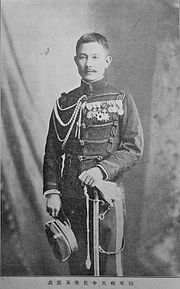- Shiba Gorō
-
Shiba Gorō
Shiba GorōBorn June 21, 1860
Aizuwakamatsu, Mutsu Province, JapanDied December 13, 1945 (aged 85)
Tokyo, JapanAllegiance Empire of Japan Service/branch  Imperial Japanese Army
Imperial Japanese ArmyRank General Commands held IJA 12th Division, Taiwan Army of Japan Awards Order of the Golden Kite (2nd class)
Order of the Sacred Treasure (1st class).In this Japanese name, the family name is "Shiba".Shiba Gorō (柴 五郎, 21 June 1860 – 13 December 1945) was a samurai and later a general in the Imperial Japanese Army.
Contents
Biography
Early life
Born as the 5th son of Aizu domain samurai Shiba Satazō, Shiba Gorō witnessed the events of the Boshin War as a child, and survived the domain's destruction. He joined the new Meiji government and after working for a short time for the Aomori prefecture government, he attended the Imperial Japanese Army Academy.[1] In his same class were a number of men who later rose to considerable prominence, including Uehara Yusaku, Akiyama Yoshifuru, and Hongo Fusataro. He was appointed a second lieutenant in the artillery in 1879, and first lieutenant in 1884.
Military career
After serving with the Osaka Armory, Shiba was later assigned to the Imperial Guards unit. In 1895, he served in the First Sino-Japanese War.
As a colonel in 1900, Shiba was military attaché at the Japanese legation during the Boxer Rebellion. He served with distinction during that campaign, including the siege of Beijing, and was awarded with decorations by many of the western nations in the Eight-Nation Alliance participating in the combat. His name was also mentioned in The Times.
He subsequently served in an artillery regiment in the Russo-Japanese War, and was awarded the Order of the Golden Kite (2nd class), for bravery in battle. He was later sent as military attaché to Great Britain.
Later, after becoming a general, Shiba returned to Japan to take command of the newly formed IJA 12th Division and was also awarded the Order of the Sacred Treasure (1st class). He was chosen to accompany Prince Higashifushimi Yorihito on an official visit to England in 1918. After his return to Japan, he was briefly placed in charge of the Taiwan Army before retirement.
He died of complications from a suicide attempt after the Japanese surrender after the Pacific War in 1945.
Literary career
Shiba is also the author of his memoirs "Remembering Aizu" (Boshin Junnan Kaikoroku, "A Record of the Sacrifices of the Boshin War" in Japanese). The book portrays his childhood years and family life, as well as an insider's view of the Meiji Restoration in Japan. This view includes a description of the difficulties faced by the Aizu daimyo Matsudaira Katamori and the rest of the domain's population, wrapping up with Shiba's return to Aizu in the 1870s. He also wrote an account of the siege of Beijing, titled Pekin rōjō (北京篭城).
His brother, Shiba Shirō, under the pen name Tokai Sanshi, was also famous during the mid-Meiji period, as the author of "Chance Encounters with Beautiful Women" (Kajin no Kigu), a fictionalized account of his time as a student at the University of Pennsylvania in Philadelphia.
Honors
- Royal Victorian Order, Honorary Commander, 1907.[2]
See also
- Claude MacDonald
References
Books
- Edgerton, Robert (1999). Warriors of the Rising Sun: A History of the Japanese Military. Westview Press.. ISBN 0813336007.
- Ishimitsu, Mahito; Teruko Craig, trans (2000). Remembering Aizu: The Testament of Shiba Goro. Honolulu: University of Hawaii Press.. ISBN 0-8248-2130-0.
External links
- National Diet Library. "Shiba, Goro". Portraits of Modern Historical Figures. http://www.ndl.go.jp/portrait/e/datas/275.html.
- Website with data on former Aizu retainer families, including the Shiba
Notes
- ^ National Diet Library, Portraits of Modern Historical Figures
- ^ London Gazette: on the occasion of Prince Fushimi Sadanaru's visit to England
Categories:- Japanese military personnel of the Boxer Rebellion
- Samurai
- People in Meiji period Japan
- 1860 births
- 1945 deaths
- Japanese generals
- People of the First Sino-Japanese War
- Japanese military personnel of the Russo-Japanese War
- Japanese writers
- People from Aizu Domain
- Aizu-Matsudaira retainers
- Recipients of the Order of the Golden Kite
- Recipients of the Order of the Sacred Treasure
- Recipients of the Order of the Rising Sun
- Honorary Commanders of the Royal Victorian Order
- Légion d'honneur recipients
Wikimedia Foundation. 2010.

